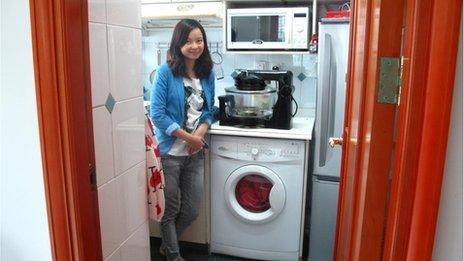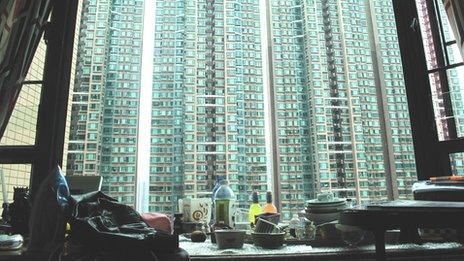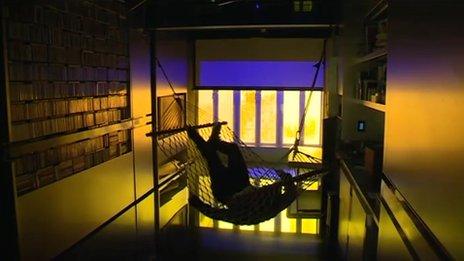Hong Kong copes with tight living spaces
- Published
Jennifer Pak on creative solutions to living in tight spaces in Hong Kong
In Hong Kong, every corner and gap is precious. Architect Gary Chang knows - he grew up in a 32 sq m (344 sq ft) flat in the Kowloon area.
The flat was partitioned into three tiny bedrooms, a kitchen and a bathroom. Mr Chang slept in the hallway while five other family members squeezed into two rooms. Incredibly, they also rented out the third bedroom.
Mr Chang says this experience was not unique in the territory in the 1970s.
"Back then, many people would live together under the same roof," he said. "We learned to be less vocal in order to keep the peace between family members."
Four decades later, however, the housing situation has not improved much.
Smaller living

Mr Chang made stylish improvements to his flat
Property prices in Hong Kong are among the highest in the world.
According to government statistics, flats the size of Mr Chang's family home in the heart of Hong Kong had doubled in price between 2007 and 2012, to an average of 108,546 Hong Kong dollars ($13,980; £9200) per square metre.
Even in older neighbourhoods further out in Kowloon, where Mr Chang grew up, apartments cost HK$80,216 per square metre.
More and more, Hong Kong people are coping by living in smaller spaces. A family of four commonly lives in a flat of less than 50 sq m.
Those at the bottom of the scale cram into older flats that are subdivided into cubicles.
The poor also rent so-called cage homes - wire mesh cages that can only fit a thin mattress stacked on top of each other. The areas are poorly ventilated and have inadequate sewage facilities, posing health and safety risks.
The existence of such appalling living conditions have "cast a dark shadow" on the thriving territory, said Hong Kong leader CY Leung in January during his first major policy speech.
Mr Leung pledged to tackle the housing problem by building 92,000 affordable homes over the next five years.
In the meantime, those who can afford to own or rent apartments try to adapt to smaller living.
Costly renovations
Mr Chang has found a stylish way to maximise space in his childhood home, where he now lives alone.

Maple Ma uses a halogen pot for cooking in her kitchen to save space
Five years ago, he installed tracks on the ceiling and rollers to build a sliding wall system to transform the open-plan studio apartment into many different rooms.
He gently pulls the steel handles along the walls to show a walk-in closet on the other side, then slides another panel out to reveal a full-sized bathtub. At the other end of the apartment, a kitchen is hidden behind the wall upon which the television is mounted.
"I'm too lazy to walk. So I've designed the apartment in a way where the rooms transform around me. Every room uses the entire floor area to maximise space," he said.
Mr Chang did not specify how much he paid for the renovations, but said they cost as much as the flat itself.
Few people in Hong Kong can afford that investment. So for most residents, it's a constant battle against clutter.
On the other side of the territory, Maple Ma and her husband Dave Li live in an apartment twice the size of Mr Chang's, but they are starting to feel cramped.
"When we buy something it's always a concern whether we have room for it. If I buy a piece of clothing I might have to throw another one away," Ms Ma said.
"It doesn't always happen but that's what it's come down to."
The hardest place to find storage is the kitchen - the narrow area tucked behind the living room also doubles as the laundry room.
So Ms Ma has learned to adapt by cooking with only one electric pot. The gadget can grill, bake, fry, defrost and steam using a halogen light as heat. It replaces her oven, microwave and electric stove.

A family with four members typically squeezes into a flat of less than 50sqm
Adapting gadgets
The Hong Kong company behind the appliance, German Pool, says sales of the halogen cooking pot have increased 40-fold since 2006 to 100,000 last year, amid growing demand for space-saving gadgets that perform multiple functions.
German Pool started by selling electric water heaters but later branched out to kitchen appliances. Adapting gadgets to Hong Kong's living conditions is what will drive the company's future growth, says managing director Edward Chan.
"In many of our cooking appliances we want to contain the grease splatter and steam, so that cooking is more enjoyable in tiny spaces," said Mr Chan.
But he says that although customers want to save space, they do not want to skimp on quality. German Pool's latest product is an automatic stir-fry pot that can cook raw grains of rice into a decadent sticky rice dish in 12 minutes without splattering grease over the countertop.
Hong Kong has long dealt with a housing crunch. But an industry based on small-spaced living is only starting to grow now, says associate professor of architecture at Hong Kong University, Jia Beisi.

Mr Chang's creative approach allows him to include a private home theatre in his flat
In the past, people had to make whatever space they had work because they had large families, he said.
Now that residents have more money and smaller families, they are willing to spend on gadgets or renovating their small space to make apartments more multi-functional, he added.
Small living can also turn out to be quite luxurious, as Mr Chang has proven.
His apartment transforms into a home theatre - a blue projector screen unfurls slowly with the click of a remote.
He hangs a hammock on industrial hooks attached to the ceiling. "It's my favourite room," he said.
For Mr Chang, there is always room for indulgence, no matter how small the space.
- Published7 January
- Published29 October 2012
- Published18 February 2012